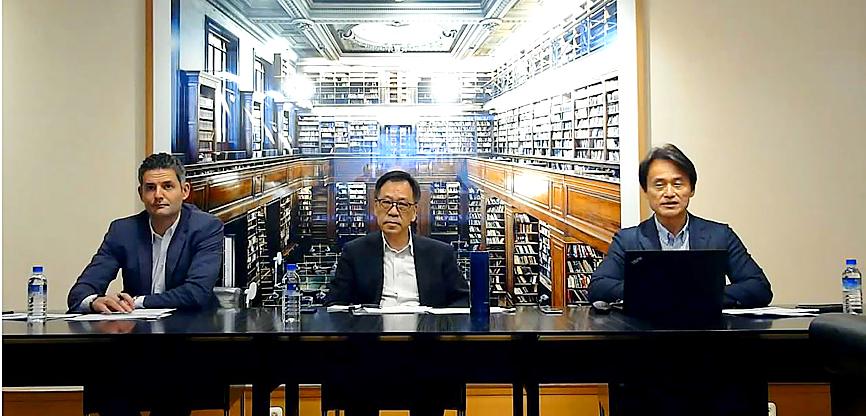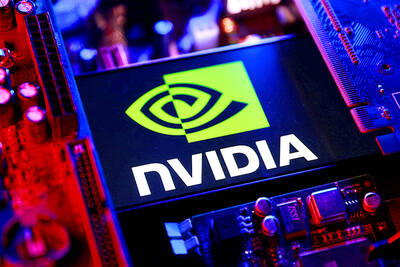Passive components maker Yageo Corp (國巨) yesterday said revenue would be flat or grow modestly this quarter amid steady market demand, ending three straight quarters of declines.
Yageo’s revenue has dropped for three straight quarters amid sluggish demand and excessive inventory.
In the first quarter of this year, revenue contracted 9.5 percent quarter-on-quarter and 13.4 percent year-on-year to NT$26.1 billion (US$852.6 million), while net income shrank 0.8 percent quarterly and 33.8 percent annually to NT$4.13 billion, the company said.

Photo: Chang Hui-wen, Taipei Times
Yageo CEO David Wang (王淡如) said revenue would stop falling this quarter and likely be flat or increase slightly from last quarter.
“Hopefully, this will be a good sign,” he told an online investors’ conference in Taipei. “Visibility is not clear yet, but the second half of the year is usually a high season and will be slightly higher than the first half.”
Gross margin would improve slightly from 33 percent in the first quarter, primarily due to cost management and a better product portfolio, he said.
Yageo’s gross margin has fallen since it posted 38.8 percent in the second quarter of last year.
The average selling prices of Yageo products is expected to be stable this quarter, it said.
INVENTORY WOES
Yageo executive vice president of global sales and marketing Claudio Lollini said the firm’s inventory level remains quite high, particularly at global distributors, even though the situation is slightly better in China.
Demand for passive components used in smartphones and laptop computers has not returned to the pre-slump level, Lollini said, but added that Yageo continues to see encouraging signs from the industrial and automotive segments.
Components for the two segments were the biggest revenue sources last quarter, contributing 23 percent and 31 percent respectively.
Factory utilization would hold steady at 70 percent for its premium products this quarter, Wang said, adding that utilization for its commodity products would be unchanged at 40 to 50 percent.
Premium passive components, including multilayer ceramic capacitors, contributed 75 percent to Yageo’s total revenue last quarter, with commodity components making up the remaining 25 percent.

POWERING UP: PSUs for AI servers made up about 50% of Delta’s total server PSU revenue during the first three quarters of last year, the company said Power supply and electronic components maker Delta Electronics Inc (台達電) reported record-high revenue of NT$161.61 billion (US$5.11 billion) for last quarter and said it remains positive about this quarter. Last quarter’s figure was up 7.6 percent from the previous quarter and 41.51 percent higher than a year earlier, and largely in line with Yuanta Securities Investment Consulting Co’s (元大投顧) forecast of NT$160 billion. Delta’s annual revenue last year rose 31.76 percent year-on-year to NT$554.89 billion, also a record high for the company. Its strong performance reflected continued demand for high-performance power solutions and advanced liquid-cooling products used in artificial intelligence (AI) data centers,

SIZE MATTERS: TSMC started phasing out 8-inch wafer production last year, while Samsung is more aggressively retiring 8-inch capacity, TrendForce said Chipmakers are expected to raise prices of 8-inch wafers by up to 20 percent this year on concern over supply constraints as major contract chipmakers Taiwan Semiconductor Manufacturing Co (TSMC, 台積電) and Samsung Electronics Co gradually retire less advanced wafer capacity, TrendForce Corp (集邦科技) said yesterday. It is the first significant across-the-board price hike since a global semiconductor correction in 2023, the Taipei-based market researcher said in a report. Global 8-inch wafer capacity slid 0.3 percent year-on-year last year, although 8-inch wafer prices still hovered at relatively stable levels throughout the year, TrendForce said. The downward trend is expected to continue this year,

‘BASICALLY A BAN’: Sources said the wording governing H200 imports from officials was severe, but added that the regulations might change if the situation evolves Chinese customs authorities told customs agents this week that Nvidia Corp’s H200 artificial intelligence (AI) chips are not permitted to enter China, three people briefed on the matter said. Chinese government officials also summoned domestic technology companies to meetings on Tuesday, at which they were explicitly instructed not to purchase the chips unless necessary, two of the people and a third source said. “The wording from the officials is so severe that it is basically a ban for now, though this might change in the future should things evolve,” one of the people said. The H200, Nvidia’s second-most powerful AI chip, is one

A proposed billionaires’ tax in California has ignited a political uproar in Silicon Valley, with tech titans threatening to leave the state while California Governor Gavin Newsom of the Democratic Party maneuvers to defeat a levy that he fears would lead to an exodus of wealth. A technology mecca, California has more billionaires than any other US state — a few hundred, by some estimates. About half its personal income tax revenue, a financial backbone in the nearly US$350 billion budget, comes from the top 1 percent of earners. A large healthcare union is attempting to place a proposal before